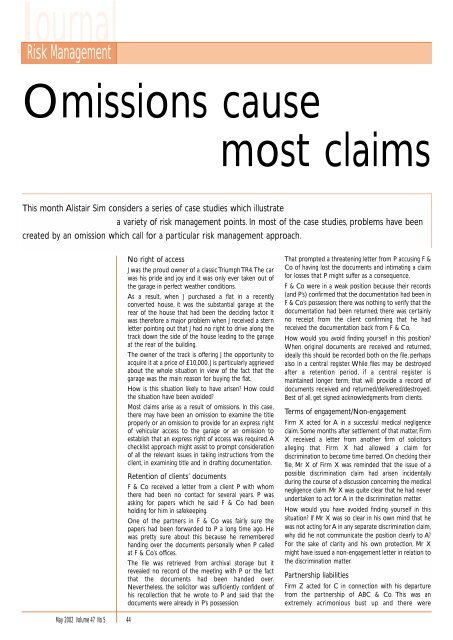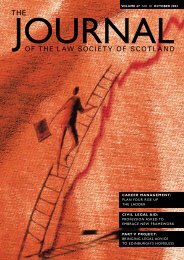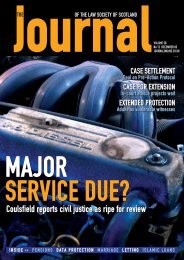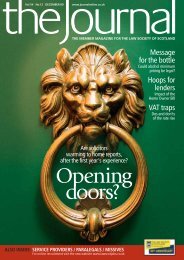OF THE LAW SOCIETY OF SCOTLAND - The Journal Online
OF THE LAW SOCIETY OF SCOTLAND - The Journal Online
OF THE LAW SOCIETY OF SCOTLAND - The Journal Online
Create successful ePaper yourself
Turn your PDF publications into a flip-book with our unique Google optimized e-Paper software.
<strong>Journal</strong><br />
Risk Management<br />
Omissions cause<br />
most claims<br />
This month Alistair Sim considers a series of case studies which illustrate<br />
a variety of risk management points. In most of the case studies, problems have been<br />
created by an omission which call for a particular risk management approach.<br />
May 2002 Volume 47 No 5 44<br />
No right of access<br />
J was the proud owner of a classic Triumph TR4.<strong>The</strong> car<br />
was his pride and joy and it was only ever taken out of<br />
the garage in perfect weather conditions.<br />
As a result, when J purchased a flat in a recently<br />
converted house, it was the substantial garage at the<br />
rear of the house that had been the deciding factor. It<br />
was therefore a major problem when J received a stern<br />
letter pointing out that J had no right to drive along the<br />
track down the side of the house leading to the garage<br />
at the rear of the building.<br />
<strong>The</strong> owner of the track is offering J the opportunity to<br />
acquire it at a price of £10,000. J is particularly aggrieved<br />
about the whole situation in view of the fact that the<br />
garage was the main reason for buying the flat.<br />
How is this situation likely to have arisen? How could<br />
the situation have been avoided?<br />
Most claims arise as a result of omissions. In this case,<br />
there may have been an omission to examine the title<br />
properly or an omission to provide for an express right<br />
of vehicular access to the garage or an omission to<br />
establish that an express right of access was required. A<br />
checklist approach might assist to prompt consideration<br />
of all the relevant issues in taking instructions from the<br />
client, in examining title and in drafting documentation.<br />
Retention of clients’ documents<br />
F & Co received a letter from a client P with whom<br />
there had been no contact for several years. P was<br />
asking for papers which he said F & Co had been<br />
holding for him in safekeeping.<br />
One of the partners in F & Co was fairly sure the<br />
papers had been forwarded to P a long time ago. He<br />
was pretty sure about this because he remembered<br />
handing over the documents personally when P called<br />
at F & Co’s offices.<br />
<strong>The</strong> file was retrieved from archival storage but it<br />
revealed no record of the meeting with P or the fact<br />
that the documents had been handed over.<br />
Nevertheless, the solicitor was sufficiently confident of<br />
his recollection that he wrote to P and said that the<br />
documents were already in P’s possession.<br />
That prompted a threatening letter from P accusing F &<br />
Co of having lost the documents and intimating a claim<br />
for losses that P might suffer as a consequence.<br />
F & Co were in a weak position because their records<br />
(and P’s) confirmed that the documentation had been in<br />
F & Co’s possession; there was nothing to verify that the<br />
documentation had been returned; there was certainly<br />
no receipt from the client confirming that he had<br />
received the documentation back from F & Co.<br />
How would you avoid finding yourself in this position?<br />
When original documents are received and returned,<br />
ideally this should be recorded both on the file, perhaps<br />
also in a central register. While files may be destroyed<br />
after a retention period, if a central register is<br />
maintained longer term, that will provide a record of<br />
documents received and returned/delivered/destroyed.<br />
Best of all, get signed acknowledgments from clients.<br />
Terms of engagement/Non-engagement<br />
Firm X acted for A in a successful medical negligence<br />
claim. Some months after settlement of that matter, Firm<br />
X received a letter from another firm of solicitors<br />
alleging that Firm X had allowed a claim for<br />
discrimination to become time barred. On checking their<br />
file, Mr X of Firm X was reminded that the issue of a<br />
possible discrimination claim had arisen incidentally<br />
during the course of a discussion concerning the medical<br />
negligence claim. Mr X was quite clear that he had never<br />
undertaken to act for A in the discrimination matter.<br />
How would you have avoided finding yourself in this<br />
situation? If Mr X was so clear in his own mind that he<br />
was not acting for A in any separate discrimination claim,<br />
why did he not communicate the position clearly to A?<br />
For the sake of clarity and his own protection, Mr X<br />
might have issued a non-engagement letter in relation to<br />
the discrimination matter.<br />
Partnership liabilities<br />
Firm Z acted for C in connection with his departure<br />
from the partnership of ABC & Co. This was an<br />
extremely acrimonious bust up and there were










